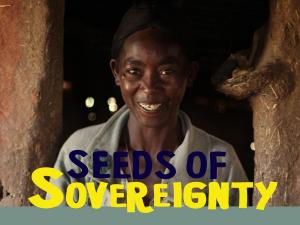As the world’s agriculture and food systems face a crisis of disappearing seed diversity, a new short film offers a compelling insight into the ways in which African farming communities and organisations are reviving traditional seed diversity across the continent, and resisting mounting corporate pressure to use industrialised seed and farming methods.
Seeds of Sovereignty, from The Gaia Foundation, in collaboration with MELCA-Ethiopia, GRAIN and the African Biodiversity Network will be launched online on Tuesday 3rd December. It follows the landmark 2012 film Seeds of Freedom, narrated by Jeremy Irons.
Liz Hosken, Director of The Gaia Foundation said: “Seed diversity is at the heart of food sovereignty – people’s right to control their own food and farming systems. Evidence shows time and again that it is small-scale farmers who are still producing the vast majority of the seeds feeding the world. These are resilient, nutritionally diverse, socially just and ecologically sound farming practices. Now more than ever, as we face an increasingly unpredictable climate, the future of food for generations to come depends on all of us supporting small-scale, diversity enhancing farming systems, across the planet. ”
Seeds of Sovereignty shows how African communities are re-valuing and reviving their diverse indigenous seed varieties alongside the knowledge associated with these practices. The film takes the viewer on a journey with communities rebuilding their resilience through a series of processes including dialogues with knowledgeable elders, eco-cultural maps and calendars, and networks of exchange. The journey of those in the film is relevant to farming communities the world over.
The film shows that farmers around the world have saved and bred an unimaginable wealth of seed diversity in order to meet diverse challenges and needs. This has created the global variety of cultural foods we see today. However, as an increasingly aggressive corporate lobby promotes hybrid and genetically modified seed, alongside chemical inputs, this diversity and knowledge is steadily disappearing.
Henk Hobbelink from GRAIN states: “In Africa, 80% of the seeds are still developed by small farmers. It is precisely this “market” that the corporations are targeting. This is the incentive behind an unprecedented agri-business initiative to force Africa, region by region, to adopt and “harmonise” draconian laws which would criminalize farmers for saving and exchanging seed, thereby radically undermining diversity.”
Million Belay, of MELCA-Ethiopia and the Alliance for Food Sovereignty in Africa (AFSA) adds: “The UN Food and Agriculture Organisation (FAO) estimates that 75% of global crop diversity has disappeared since the advent of industrialized farming, and the same is now happening in Africa. There has never been a more critical time to hear another story – a story of action, commitment and resilience, which reminds the world that Africa values it’s traditional food diversity and seed wealth and is prepared to fight for it.”
Through interviews and stunning cinematography from across the continent, the 35-minute film unpacks an approach aligned to the principles of the growing global food and seed sovereignty movement and provides a guide for anyone looking to revive traditional, diversity rich, seed and farming systems around the world.
Watch the film here and find out more by visiting the website www.seedsoffreedom.info

